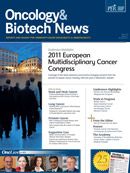Publication
Article
Oncology & Biotech News
Adjuvant Zoledronic Acid May Improve Disease-Free Survival for Postmenopausal Women With Breast Cancer
Author(s):
A subanalysis of the AZURE study found that postmenopausal women had a disease-free survival advantage from the addition of zoledronic acid to their therapy.

Robert E. Coleman, MD
An interim analysis of the large randomized AZURE trial found that zoledronic acid did not benefit patients of all ages with stage II/III breast cancer when added to chemotherapy and/or endocrine therapy. However, a subanalysis of the study found that postmenopausal women had a disease-free survival (DFS) advantage from the addition of zoledronic acid to their therapy, and this benefit was seen in postmenopausal women, regardless of tumor stage, estrogen receptor status, and lymph node involvement. The subanalysis was published online in the New England Journal of Medicine to coincide with the presentation at the 2011 European Multidisciplinary Cancer Congress.
The subanalysis showed that DFS was improved by 25% in postmenopausal women taking zoledronic acid in addition to standard therapy (P = .02), and overall survival was improved by 26% in this group of women (P = .04). For the subanalysis, postmenopausal was defined as having been in menopause for >5 years at the time of diagnosis; this definition applied to 1041 women enrolled in the trial.
“The finding is not sufficient to be adopted on its own, and I’m sure it will be debated,” said Robert E. Coleman, MD, of Weston Park Hospital in Sheffield, United Kingdom. “We are planning a further prospective study [of zoledronic acid] in older women and other data will be presented in San Antonio. If all the data are supportive, it would be likely to change practice.”
AZURE randomized 3360 women with stage II/III breast cancer to standard adjuvant therapy (ie, chemotherapy, hormonal therapy, or radiation therapy, if appropriate) with zoledronic acid or standard adjuvant therapy plus placebo. Patients were treated with zoledronic acid for 5 years, and the primary endpoint was DFS.
“We accepted all comers—women who were young and old, and women with hormone-sensitive and hormone-insensitive breast cancer—which is different from many other studies in breast cancer,” said Coleman.
There were no significant differences between the groups in the primary endpoint at the median follow-up of 59 months. The rate of DFS was 77% in each group. The number of deaths—243 in the zoledronic acid group and 276 in the control group—were also similar. “The primary endpoint of DFS at first looks disappointing,” he said. “When you consider all patients, there is no difference in DFS. That overall result is not likely to change. So zoledronic acid is not a treatment for every woman with breast cancer.”
“The only important subgroup difference was related to menopausal status, in that women who were at least 5 years postmenopausal showed a preferential benefit for the addition of zoledronic acid to their standard therapy,” said Coleman. “They had a significant improvement in DFS, whereas no benefit was seen in younger patients. There is only a 1-in-5000 chance that this is a fluke finding.”
Commenting on this study, Christoph C. Zielinski, MD, of the Medical University in Vienna, Austria, said: “Whereas the earlier data from the AZURE trial did not show any influence of zoledronic acid on outcomes in an unselected population, the present results show that postmenopausal patients do benefit from this approach. These data are similar to the ABCSG-12 data reported previously, where hormonal medication was given to premenopausal patients to induce menopause. Taken together, that trial and the current subgroup analysis of AZURE provide a high level of evidence for the benefit of adding zoledronic acid to adjuvant therapy for early breast cancer in either naturally or medically induced postmenopausal women.”










